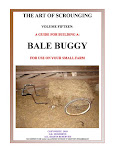Items to Look For
Observe
It won't take long for you to learn what to keep an eye out for! One of the best ways to learn is to go to auctions and WATCH. Learn what others are NOT bidding on! Instead of getting right up front, stand back a bit, and OBSERVE. Remember, you're not there to find "deals" to buy and sell for profit (that's a whole 'nother idea!). You will encounter a lot of "scrap iron" buyers at sales. These are the guys who are buying scrap for the purpose of selling it, not using it. Most of the "piles" of scrap go to these people. You may be able to latch onto a few, but generally they will bid them up to scrap iron price, or near to it. Look for the things that are not in nice, neat piles - the ones that may take a little time to separate and haul out. Larger piles of miscellaneous scrap tend to go for less. A scrap buyer wants "neat" piles he can load out in a few minutes.
Cleaning Up
After most sales, there are unwanted items that will be left behind. If you see someone dicarding something that you may need, ask the buyer if he'd mind if you take it. You may even offer him $1 for it. You just never know! I have also had good luck with "No Bid" items. Keep a mental or written note , and after the sale, offer the auctioneer $1 or even 50 cents for an item that was passed by. I have even stopped by the sale a couple of days afterwards and asked about "junk" items that were left behind. Sometimes the sellers will let you haul it away for nothing or dirt cheap. Remember that a sale for most families means a death in the family, illness, divorce, or just plain "giving it up". Be keenly aware of their feelings and thank them for their time, even if they tell you no. You could even ask them at the sale if they mind if you stopped by.
Be On The Lookout!
Here is a list of some of the things to be looking for, wether you are at an auction, or just driving around the countryside:
hinges nuts, bolts, washers any kind of brackets chain or chain parts lumber
anything made from angle iron anything made from flat iron sheet metal barn tin
telephone poles (8' or longer) wire barb wire fence materials T posts
old implements (even if they are to large) rake, baler, or combine teeth gates
pipe (especially 2") rail road spikes rail road ties eye bolts turn buckles
PVC or ABS pipe disc blades cultivator shanks square tubing large bolts
grain bins, or parts for them small sheds to be torn down and/or moved clevis pins
draw pins lynch pins hydraulic cylinders steel rod gearboxes pulleys
sprockets steel shafts nails concrete blocks screws pallets
useable light fixtures old fuse boxes cattle/hog panels woven wire flat belting
old-fashioned metal bed spring large satellite dishes electric fence posts



No comments:
Post a Comment